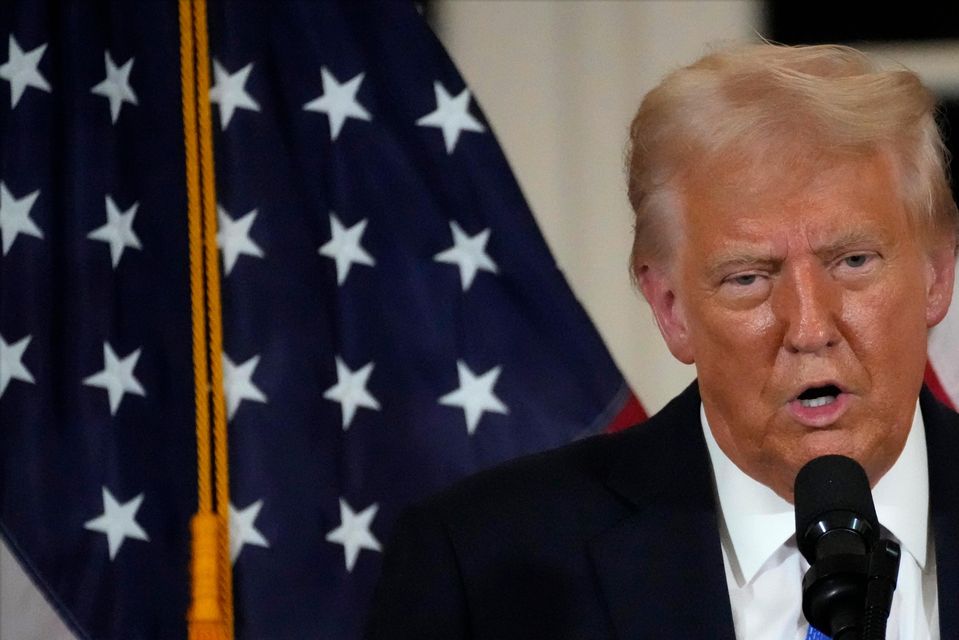Prime minister Justin Trudeau on Friday said US President Donald Trump’s talk of making Canada the 51st US state is “a real thing” and is linked to the country’s rich natural resources, local media reported.
Mr Trudeau’s comments to business and labour leaders in a closed-door session were mistakenly carried by a loudspeaker, Canada’s public broadcaster CBC reported.
“Mr Trump has it in mind that the easiest way to do it is absorbing our country and it is a real thing. In my conversations with him on…,” Mr Trudeau said of making Canada a US state before the microphone cut out, according to CBC.
“They’re very aware of our resources, of what we have and they very much want to be able to benefit from those,” Mr Trudeau reportedly said.
Mr Trudeau’s office did not immediately respond to a request for comment.
President Donald Trump on Monday agreed to a 30-day pause on threats to impose 25% tariffs on imports from Mexico and Canada (AP Photo/Ben Curtis)
In a post on social platform X, Gil McGowan, president of the Alberta Federation of Labor, confirmed what Mr Trudeau said.
“Yes, I can confirm that Trudeau said his assessment is that what Trump really wants is not action on fentanyl or immigration or even the trade deficit, what he really wants is to either dominate Canada or take it outright,” Mr McGowan wrote.
Mr Trump has repeatedly suggested Canada would be better off if it agreed to become the 51st US state.
In public comments on Friday, Mr Trudeau said Canada must think “tactically and strategically” on how to deal with Mr Trump’s threats to impose hefty tariffs on all Canadian imports.
Speaking in Toronto at the opening of a one-day summit on the Canada-US economic relationship, Mr Trudeau said the country must work with the US to avoid tariffs, adding that Canada needs to eliminate internal trade barriers and expand its trade with other nations.
“This is a moment,” said Mr Trudeau. “This is a time in our country’s history that really matters.”
Mr Trump on Monday agreed to a 30-day pause on threats to impose 25% tariffs on imports from Mexico and Canada, with another 10% tariff on Canadian oil, natural gas and electricity.
Mr Trump had threatened the tariffs to ensure greater cooperation from the countries to stop illegal immigration and prevent fentanyl smuggling, but he has also pledged to use tariffs to boost domestic manufacturing and raise revenues for the federal government.
Mr Trudeau said Canada can use the 30-day extension to show US officials the country’s increased spending on border security. Canada has announced a 1.3 billion Canadian dollars (£729 million) border security plan that includes drones, helicopters, more border guards and the creation of a joint task force.
Mr Trudeau also has promised to appoint a new fentanyl czar, who will serve as the primary liaison between the Canadian and US governments, even though less than 1% of the fentanyl and illegal immigrant crossings into the US come from Canada.
“We need to be very deliberate about how we continue to engage closely with the United States to make the case that Canada is responsible for a tiny part of the North American fentanyl problem, but that we are also bitterly touched by this tragedy,” Trudeau said.
He added that Canada needs to be prepared if Mr Trump decides to go ahead with the tariffs after 30 days.
“We need to be ready to respond robustly,” he said. “We also have to be ready to support Canadians through the responses we’re giving and through a difficult time of tariffs.”
Canada had planned to retaliate to the US action with 25% tariffs on more than 100 billion US dollars worth of American goods.
Mr Trudeau said it is also time to have “genuine free trade in Canada”, while strengthening its trade relationships with other countries.
Candace Laing, president and chief executive of the Canadian Chamber of Commerce, said she is happy the meeting is focused on internal trade, trade diversification and responding to US tariffs.
“It’s clear that we can’t just tinker around the edges with incremental steps right now,” she said in a statement.
“We’ve got to be bold so that businesses and communities can pivot to be more resilient and less reliant on what happens in the U.S.”
